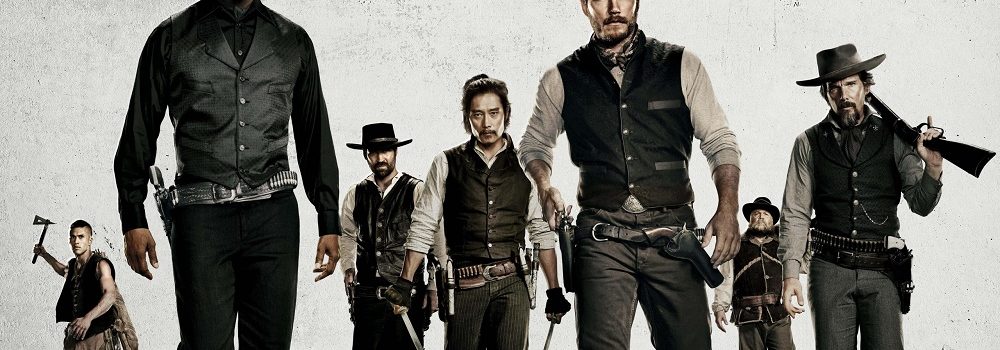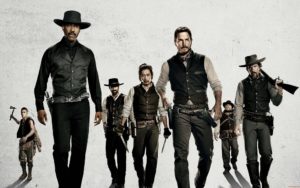The classic 1960 film, The Magnificent Seven, was itself a remake of the 1954 iconic Akira Kurosawa Seven Samurai. So, why remake a remake? In today’s age of remakes and sequels, that is actually a stupid question. A familiar brand equals money at the box office, or so thinks the studio brass here in town. If a film is going to be remade, pundits say, at least pick a film that got it wrong the first time, not one that is considered a classic. Then again, if you’re tackling a legendary movie, at least bring something new to the table.
What Antoine Fuqua’s The Magnificent Seven does is something actually quite remarkable. It does not add anything new to the classic and frankly the western genre itself. But, what it does do is showcase a director working at the top of his game and an ensemble cast given meaty roles that finds the audience emotionally connecting to them and putting our heroes in a situation that is as timely today as it is during the 1800s landscape where our story takes place.
Denzel Washington stars as Chisolm, a bounty hunter who always has his eyes firmly focused on justice. After taking care of a job, he is approached by Emma Cullen (Haley Bennett), a recent widow whose husband lost his life standing up to the robber baron Bartholomew Bogue (Peter Sarsgaard). Bogue has essentially taken over her hometown and given residents the dark choice between selling their land at a fraction of what it is worth or facing sure death at the hands of the army the baron has anchored in their small western outpost.
With all sorts of “need for justice” screaming from this situation, Chisolm takes Cullen’s offer and sets out in search of a team to extol revenge for Cullen, and a little bit of western righteousness brought by a bounty hunter with a keen sense of right and wrong. After all, he’s a Civil War veteran who knows a thing or two about how things should be in this world we call home. Chisolm, Cullen and her associate Teddy Q (Luke Grimes) span out and find six more guns-for-hire that collectively Chisolm hopes will form a team that no evil army can beat.
The ensemble is fantastic and impeccably cast. Chris Pratt is Josh Faraday, a gunslinger/gambler who is gifted with the most charming and hilarious lines of the movie. Pratt delivers them as only he can, which is a stroke of self awareness and a large dose of humorous confidence. Ethan Hawke is Goodnight Robicheaux. It’s a role that re-teams the stellar actor with his Training Day star and director. Hawke brings levels of emotion turmoil to the part of a southern Civil War veteran who firmly believes that killing has done nothing but hurt his soul. To say he is a reluctant fighter, well, that is a gross understatement.
The “Seven” of the title is filled out by Vincent D’Onofrio’s burly Jack Horne, Byung-hun Lee’s knife-throwing wizard Billy Rocks, Manuel Garcia-Rulfo’s Vasquez and Martin Sensmeier’s Native American Red Harvest.
Fuqua had the tough task of bringing a seven-person team of heroes to life in a manner that adequately introduces the characters, gives them camaraderie and cinematic chemistry, and delivers a personal pull that the audience will identify with as the action heats up in this righteous battle between the haves and the have nots. Richard Wenk and Nic Pizzolatto’s screenplay (which was actually based more on the Seven Samurai screenplay than the 1960 American take) masterfully weaves a web that pulls the audiences in, has them emotionally attached to the characters and the cost of what they are attempting to achieve, as well as mixing in some of the most well-staged action sequences we’ve seen in a modern western in some time.
It is also quite timely. Bogue reminds us completely of a few big businessmen of today’s era that dominate the headlines. Bogue is a land baron who does what he has to do to get ahead, despite the costs to the average person. Not to get political here, but it’s hard not to ignore the similarities. Helping things in that department is the performance of Sarsgaard. He finds new depths of despicableness in a western villain that could have been a stereotype of a cardboard cut-out of evil doers that audiences have witnessed before. Instead, there is a heart (however shallow) and soul (however dark) to this character that brings it to life in devilish three dimensions.
Then, there’s the terrific tandem of Washington and Fuqua. These two have such an unspoken shorthand it is wondrous to witness. After Training Day and The Equalizer, these two are so on the same page and they bring out the best in each other. Washington also is given a character that is complex and compelling and the audience is easily mesmerized by that classic combination of actor meeting a role he was born to play. Fuqua, for his part, is the maestro of this symphony of visceral violence meets retribution-justice. The helmer must have felt a need to make a western. They are not a simple task to tackle. It is easy to tell the amount of work it takes to bring this genre to life in a way that doesn’t retread on the past while simultaneously entertaining an audience that has literally seen it all.
With The Magnificent Seven, Fuqua might not have brought something new to a film that many thought didn’t need a remake. But then again, he has delivered a movie that if it had been released during the summer months instead of the middle of September, we would be hailing it as the best popcorn movie of the season. In the end, isn’t that all we ask of our take-me-away-for-two-hours movies? Why yes, yes it is.
Grade: B+


